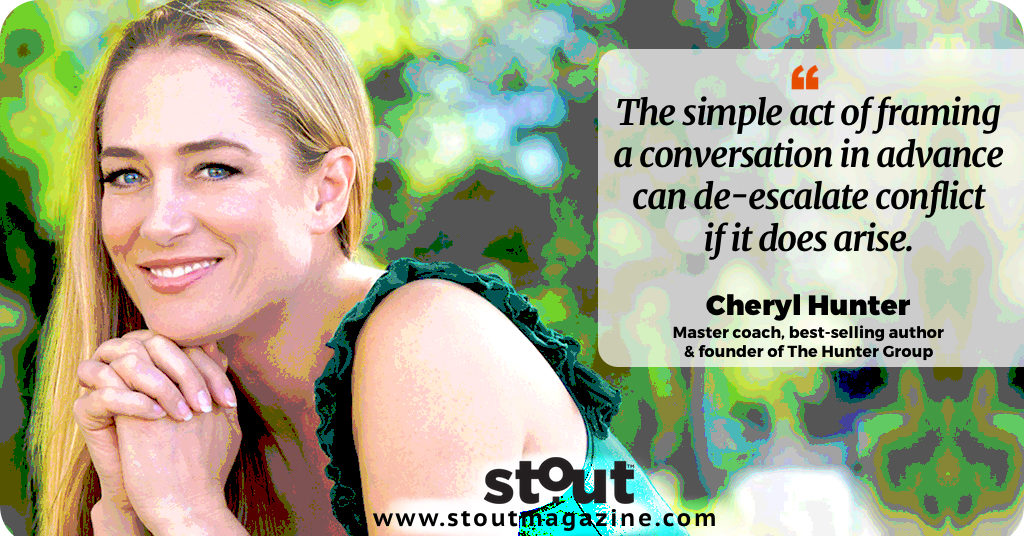
Stout Advice For Handling Conflict By Cheryl Hunter

Cheryl Hunter, master coach, best-selling author and founder of The Hunter Group
As part of our Stout focus this month on fear and conflict, guest contributor Cheryl Hunter, master coach, best-selling author and founder of The Hunter Group coaching and consulting company, shares her advice on facing, understanding and dealing with conflict.
Many people loathe conflict, and they avoid it at all costs.
That presents a problem. If we want to grow, personally, if we choose to expand in our work lives, or if we engage in relationships with any other human beings, conflict is inevitable. If we can alter our relationship with conflict from viewing it as an avoidable occurrence, to instead realizing that conflict is inevitable, we would be far better equipped to effectively handle conflict when does arise.
What I’ve found best in initiating any discussion that could potentially be received in a negative or confrontational way is to frame the discussion up front so that the other party knows what to expect in the discussion.
If, for example, I want to point out to a bright new hire that they had made a major error in their work, I would first start by saying something along the lines of, “I appreciate the great work and attention-to-detail that you’ve brought to your position over these past weeks, and I am happy you are a member of our team.” This would give the staff member an opportunity to breathe, stop worrying, and actually listen to what’s being said rather than waiting for the other shoe to drop. They’re far more apt to put in the correction if they’re not fearful about losing their job, and the re-frame allows them to be present enough to accomplish that.
If, hypothetically speaking, I were bringing up some problem to a family member or dear friend, I would first frame the conversation by expressing my love for them and telling them I want to have a discussion to get something out of the way so that nothing comes between us. This would allow them to understand that our relationship is permanent and whatever problem we’re facing is temporary.
How a conversation is framed is far less important than that it is framed.
When we frame a conversation in advance, topics that otherwise may have triggered a person can be listened to and actually heard. When we take time frame a difficult conversation, a person knows where they stand beforehand, which can make all the difference in mitigating upset.
What generally leads to conflict, in my opinion, is the fact that the recipient of the conversation doesn’t know where the conversation is headed, whether they are “in trouble,“ and if they are in fact standing on shaky ground. Understandably if the recipient of the conversation is concerned about any of those things, they’re not truly available to listen to what is being said which can compound upon the conflict. The simple act of framing a conversation in advance can de-escalate conflict if it does arise.
Try it out the next time you find yourself in the situation where you have a “difficult conversation” ahead of you. You may find yourself surprised by the results.
– Cheryl

Find out more about Cheryl, her amazing story of resilience that led her to develop her PBS-profiled Break Free Formula for turning your life around and her new RISE docuseries profiling people with compelling stories of triumph over trauma at cherylhunter.com.
At Odds Over Conflict?
Our Stoutstats below detail the pervasiveness and cost of not having strategies to work through conflict. Get more actionable advice on how to up your difficult conversation frequency and beat the stats with our Stout tools and insights for handling conflict.

Conflict By The Numbers
- Employees in the U.S. spend 2.8 hours per week involved in conflict instead of positive productivity — at a cost of $359 BILLION annually in hours paid (1)
- 85% of employees experience some kind of conflict(2), yet 60% of employees never receive basic conflict management education(3)
- 56% of all divorcing couples citing “arguing too much” as the reason for their divorce(4)
- 20.8% of all students report being bullied (5)
References:
(1) The Cost of Conflict in the Workplace, Robyn Short, February 16, 2016. (2) Workplace Conflict Statistics, Jonathan & Erik Bernstein, June 2, 2015. (3) Conflict Report, CPP Global Human Capital Report, July 2008. (4) Divorce Facts, Wilkinson & Finkbeiner, 2018. (5) National Center for Educational Statistics, 2016.
